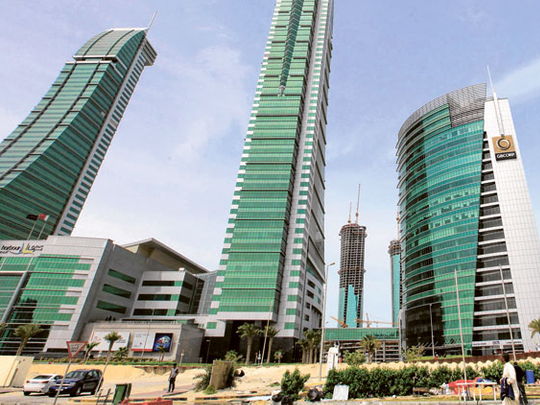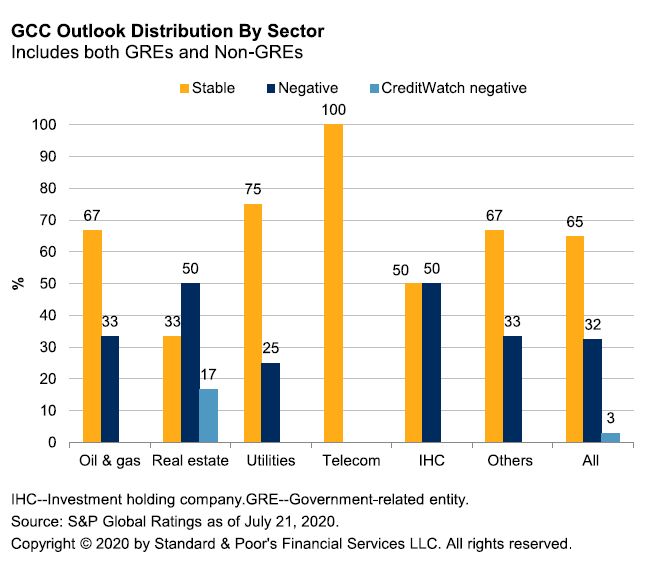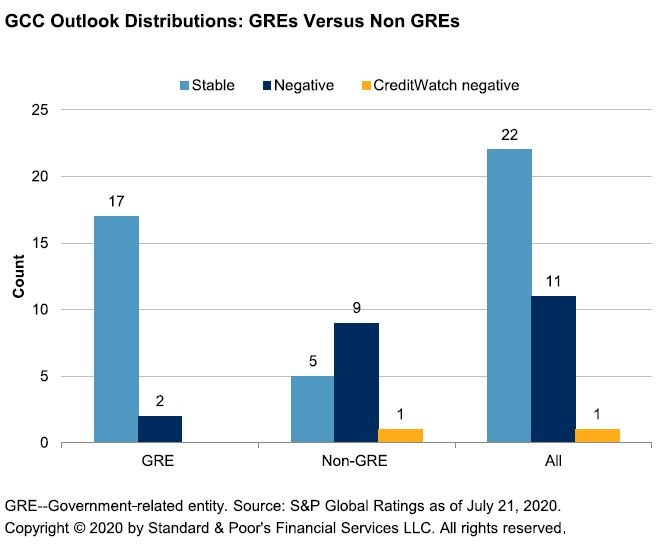
Dubai: Corporates and infrastructure players in the GCC countries are feeling the impact of global credit downturn caused by the COVID-19 pandemic, according to credit rating agency Standard & Poor’s.
Although the effects on different sectors vary with reliance on oil and tourism, the picture is largely weak for the region in 2020.
Currently about 65 per cent of S&P’s corporate and infrastructure ratings have a stable outlook, although government-related entities (GREs) represent about 55 per cent of S&P’s portfolio, with outlooks mainly linked to those on the respective sovereigns.
The rating agency has assigned stable outlook for 89 per cent of GREs they rate. However, excluding GREs, only 33 per cent the rated GCC issuers are on a stable outlook and 60 per cent of corporate portfolio is on a negative outlook.

“Since mid-March, we have taken negative rating actions on 16 rated regional players, mostly amid increased pressure from the global pandemic and a sharp fall in hydrocarbon prices, and significantly lowered our economic growth forecasts for the GCC countries,” said S&P Global Ratings credit analyst Timucin Engin.
S&P now expects a mid-to-high single digit real GDP contraction for most rated GCC sovereigns in 2020 and operating conditions to remain weak over the next few quarters.
“As a result, most regional companies’ earnings and revenue will be hit, and we have even slightly lowered top-line forecasts for relatively more resilient sectors, such as telecom, due to an overall weaker macroeconomic picture and subdued population trends,” said Engin.
Conservative Strategies
Given revenue growth challenges and a lack of clear visibility on recovery timing, the key focus for most regional corporates S&P rates is managing their cash flows and maintaining liquidity. Many are now revisiting their operating expenses, renegotiating some contracts, and eliminating unnecessary outgoings. Some companies have resorted to pay cuts and redundancies, particularly in more exposed sectors such as real estate, aviation, and tourism.
Some rated corporates are already cutting/eliminating dividends to keep cash, and we expect this trend to continue over the next few quarters. New investments are also taking a backseat and a number of companies are cutting and postponing capex, particularly in real estate.
“We expect Dubai real estate to remain under pressure in 2020 with only a partial potential recovery in 2021, which may be slow and painful given the significant oversupply in all segments even prior to the pandemic,” said S&P Global Ratings credit analyst Sapna Jagtiani.
Shrinking Capex
Many national oil majors across the region have also announced delays to investments.
“We expect a more cautious spending approach from oil and gas players, with capital expenditure cuts and downward revisions from 2020 guidance already announced so far. However, GCC national oil companies should benefit from their cost advantage compared with global peers in the low oil price environment,” said S&P Global Ratings credit analyst Rawan Oueidat.
According to the rating agency, a number of corporates in our portfolio are trying to monetize noncore assets through divestments to manage leverage. S&P thinks that current conditions may challenge disposals and valuations, but a limited number of corporates with large cash balances might look at selective opportunistic acquisitions.

Broad-based pressure
The rating agency expects broad-based pressure across most sectors and markets in the region but some will feel it more than others as economic activity decelerates, disposable income declines, and employment trends weaken.
Most GCC nations host large populations of foreign workers, which will modestly decrease over the coming quarters. Potential negative population trends should also mean some weakening of demand and revenue generation for otherwise more resilient sectors such as telecom, utilities, and food staples.
“Based on these trends, we expect noticeable changes in corporate behaviour as management teams tackle challenging conditions with limited visibility on the recovery path,” said Engin.








